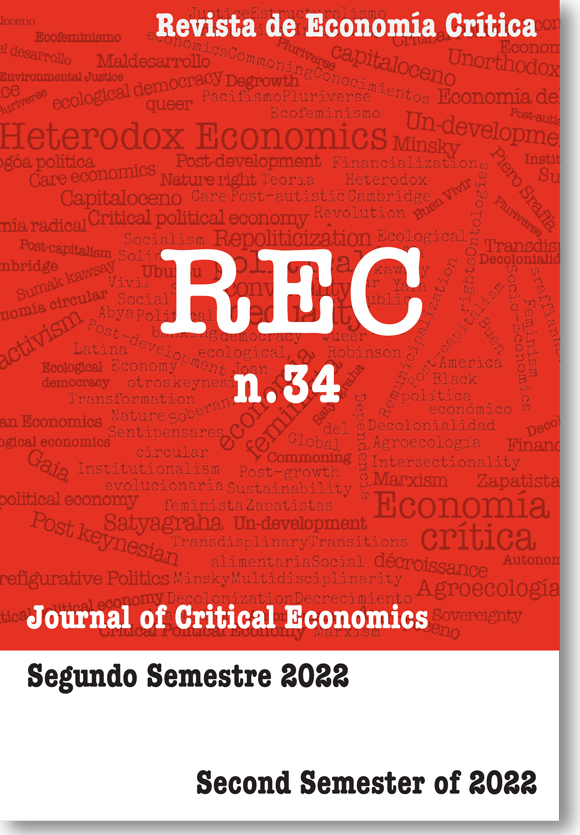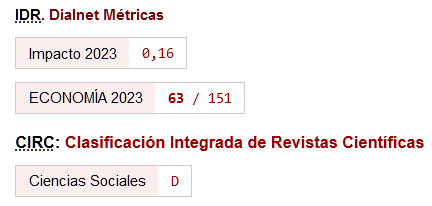Climate policy and fossil fuels
a supply-side perspective
DOI:
https://doi.org/10.46661/rec.10511Keywords:
fossil fuels, climate change, supply-side policies, divestment, green paradoxAbstract
Avoiding catastrophic effects of climate change requires a rapid and radical reduction in the use of fossil fuels. The policy that would best guarantee this would be a successful global agreement on sufficient planned reductions in the supply of these fuels. This article reviews some proposals in this regard, although so far international agreements have not adopted this supply-side approach. It also considers the potential impacts of other supply-side actions such as social movements trying to stop fossil fuel extraction or transport projects and calls for disinvestment in fossil fuels.
The most frequent climate change policies have been from the demand side. The heterogeneity and common characteristics of these policies are reviewed and their effects are discussed from the point of view of how they may affect the supply of fossil fuels. The concept of "green paradox" has been used to virtually negate the possibility of success of any climate change policy (except global fossil fuel rationing): policies that become stronger in intensity and extent would lead fossil fuel owners not to delay but to advance extraction. Without denying the possibility of some such decisions, the article concludes that the effect of climate change policies on reducing investment in fossil fuel extraction (and advancing installations closures) will almost certainly be more significant.
Downloads
References
Ahseim, G.B.; Faehn, T.; Nyborg, K.; Greaker, M.; Hagem, C.; Harstad, B.; Hoel, M.O.; Lund, D. y Rosendahl, K.E. (2019), "The case for a supply-side climate treaty", Science, vol. 365, issue 6451, 26 July 2019: 325-327. https://doi.org/10.1126/science.aax5011 DOI: https://doi.org/10.1126/science.aax5011
Baranzini, Andrea; van den Bergh, Jeroen C. J. M.; Carattini, Stefano; Howarth, Richard B.; Padilla, Emilio y Roca, Jordi, "Carbon pricing in climate policy: seven reasons, complementary instruments and political economy considerations", WIREs Climate Change, 2017, e462.
https://doi.org/10.1002/wcc.462 DOI: https://doi.org/10.1002/wcc.462
Bauer, Nico; McGlade, Christophe; Hilaire, Jérôme y Ekins, Paul, (2018) "Divestment prevails over the green paradox when anticipating strong future climate policies", Nature Climate Change, vol. 8, February: 130-138. https://doi.org/10.1038/s41558-017-0053-1 DOI: https://doi.org/10.1038/s41558-017-0053-1
Boulding, Kenneth (1966), "La economía de la futura nave espacial Tierra", Revista de Economía Crítica, n.14, 2012: 327-338
Braungardt, Sibylle; van den Bergh, Jeroen y Dunlop, Tessa (2019), "Fossil fuel divestment and climate change: reviewing contested arguments", Energy Research and Social Science, 50: 191-200. https://doi.org/10.1016/j.erss.2018.12.004 DOI: https://doi.org/10.1016/j.erss.2018.12.004
Cairns, Robert D. (2014). "The green paradox of the economics of exhaustible resources", Energy Policy, 65: 78-85. https://doi.org/10.1016/j.enpol.2013.10.047 DOI: https://doi.org/10.1016/j.enpol.2013.10.047
Collier, Paul y Venables, Anthony J. (2014), "Closing coal: economic and moral incentives", Oxford Review of Economic Policy, vol.30, n.3: 492-512. https://doi.org/10.1093/oxrep/gru024 DOI: https://doi.org/10.1093/oxrep/gru024
Gerlach, Reyer (2011), "Too much oil", CESifo Economic Studies, vol. 57, 1: 79-102. https://doi.org/10.1093/cesifo/ifq004 DOI: https://doi.org/10.1093/cesifo/ifq004
Hoel, Michael (2012), Carbon Taxes and the Green Paradox" in Hahn, R. W. and Ulph, A. (ed), Climate Change and Common Sense: Essays in Honour of Tom Schelling, Oxford University Press. https://doi.org/10.1093/acprof:oso/9780199692873.003.0011 DOI: https://doi.org/10.1093/acprof:oso/9780199692873.003.0011
Hotelling, Harold, (1931), "The Economics of Exhaustible Resources", Journal of Political Economy, vol. 22, n.9: 137-175. https://doi.org/10.1086/254195 DOI: https://doi.org/10.1086/254195
IEA (2021), Key world statistics 2021.
IPCC (2022), Climate Change 2022. Mitigation of Climate Change. Summary for Policy Makers.
Kahn, Alfred E. (1966), "The Tyranny of Small Decisions: market failures, imperfections, and the limits of Economics", Kyklos, vol. 99: 23-47. https://doi.org/10.1111/j.1467-6435.1966.tb02491.x DOI: https://doi.org/10.1111/j.1467-6435.1966.tb02491.x
Klein, Naomi (2014), Esto lo cambia todo. El capitalismo contra el clima, Ediciones Paidós, 2019.
Lazarous, Michael; Erikson, Peter; Tempest, Kevin (2015), Supply-side climate policy: the road less taken, Stockholm Environment Institute, Working Paper 2015-13.
Lazarous, Michael; van Asselt, Harro (2018), "Fossil Fuel Supply and climate policy: exploring the road less taken", Climate Policy, 150: 1-13. https://doi.org/10.1007/s10584-018-2266-3 DOI: https://doi.org/10.1007/s10584-018-2266-3
Mañé, Aurèlia (2022), "Los retos de la probable 'petrolización' del gas", El País, 8-9 de marzo https://agendapublica.elpais.com/noticia/17783/retos-probable-petrolizacion-gas
Martínez Alier, Joan (2021), Circularity, entropy ecological conflicts and LFFU, Local Environment. https://doi.org/10.1080/13549839.2021.1983795 DOI: https://doi.org/10.1080/13549839.2021.1983795
Martínez Alier, Joan y Roca Jusmet, Jordi (2013), Economía ecológica y política ambiental, tercera edición actualizada y ampliada. Fondo de Cultura Económica, México.
Newell, Peter y Simms, Andrew (2020), "Towards a fossil fuel non-proliferation treaty", Climate Policy, vol. 20, n. 8: 1043-1054.
https://doi.org/10.1080/14693062.2019.1636759 DOI: https://doi.org/10.1080/14693062.2019.1636759
OECD (2021), Effective Carbon Rates 2021: Pricing Carbon Emissions through Taxes and Emissions Trading.
Padilla Rosa, E. y Roca Jusmet, J.
(2018), "Análisis coste-beneficio versus principio de sostenibilidad: la economía del cambio climático de Nordhaus, premio Nobel 2018", Revista de Economía Crítica, n. 26, 2018: 3-18.
Petro, Gustavo y Márquez, Francia (2020), Colombia. Potencia Mundial de la Vida. Programa de Gobierno 2012-2016 (Programa por temas - Petro Presidente 2022).
Piggot, Georgia (2018), "The influence of social movements on policies that constrain fossil fuel supply", Climate Policy, vol. 18, n.7: 942-954. https://doi.org/10.1080/14693062.2017.1394255 DOI: https://doi.org/10.1080/14693062.2017.1394255
Roca Jusmet, Jordi (2019), "Are climate change policies counterproductive? A critical approach to the Green Paradox" en Barkin, D. y Carrillo, G. (coord), Ecological Economics and Social-Ecological Movements. Science, policy and challenges to global processes in a troubled world, Universidad Autónoma Metropolitana, México.
Roca Jusmet, Jordi y Padilla Rosa, Emilio (2021), "Globalización y responsabilidad en los problemas ecológicos", Revista de Economía Crítica, n.31:1-18.
Rocchi, Paola; Serrano, Mònica; Roca, Jordi y Arto, Iñaki (2018), "Border Carbon Adjustments Based on Avoided Emissions: Addressing the Challenge of Its Design", Ecological Economics, vol. 145: 126-136. https://doi.org/10.1016/j.ecolecon.2017.08.003 DOI: https://doi.org/10.1016/j.ecolecon.2017.08.003
Sen, Amartya K. (1977), "Rational fools: a critique of the behavioral foundations of economic theory", Philosophy and Public Affairs, 6: 317-344.
Sinclair, Peter J. N. (1994), "On the Optimum Trend of Fossil Fuel Taxation", Oxford Economic Papers, Vol. 46: 869-877. https://doi.org/10.1093/oep/46.Supplement_1.869 DOI: https://doi.org/10.1093/oep/46.Supplement_1.869
Sinn, Hans-Werner (2008), "Public Policies against Global Warming: a supply side Approach". International Tax and Public Finance, 15: 360-394. https://doi.org/10.1007/s10797-008-9082-z DOI: https://doi.org/10.1007/s10797-008-9082-z
Sinn, Hans-Werner (2012), The Green Paradox. A Supply-Side Approach to Global Warming, MIT Press. https://doi.org/10.7551/mitpress/8734.001.0001 DOI: https://doi.org/10.7551/mitpress/8734.001.0001
Sorrell, Steven (2007), The Rebound Effect: An Assessment of the Evidence for Economy-Wide Energy Savings from Improved Energy Efficiency, Project Report. UK Energy Research Centre.
Temper, Leah; Yánez, Yvonne; Sharife, Khadija; Ojo, Godwin y Martínez Alier, Joan (2013), Towards a Post-Oil Civilization.
The Hague District Court, 26 de mayo 2021, ECLI:NL:RBDHA:2021:5339, Rechtbank Den Haag, C/09/571932 / HA ZA 19-379 (engelse versie).
Downloads
Published
How to Cite
Issue
Section
License
Copyright (c) 2022 Jordi Roca Jusmet

This work is licensed under a Creative Commons Attribution 4.0 International License.
This licence allows third parties to share (copy and redistribute the material in any medium or format) and adapt (remix, transform and create from the material for any purpose, including commercial purposes), provided that authorship and first publication in this journal (The Journal, DOI of the work) is acknowledged, a link to the licence is provided, and it is stated whether changes have been made to the work.







